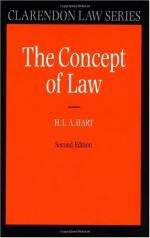|
This section contains 895 words (approx. 3 pages at 400 words per page) |

|
Chapter 4, Sovereign and Subject Summary and Analysis
In chapter four, Hart focuses on how orders given by political "sovereigns" constitute law. Typically when we speak of laws we assume that some sovereign is behind the law, either creating it or legitimating it. This sovereignty conception of law is held to be true in democracies as much as monarchies. Sovereigns are those whose orders and laws citizens habitually obey and whose laws and authority persist into the next administration or regime.
The habit of obedience is understood to apply to a limited group of people generally delimited by a geographical area. They obey by doing things they would not otherwise do. The system of obedience is, like other things, not perfectly captured by the direct order analogy as many obey without any direct interaction with the sovereign. Laws typically regulate succession in advance...
(read more from the Chapter 4, Sovereign and Subject Summary)
|
This section contains 895 words (approx. 3 pages at 400 words per page) |

|




